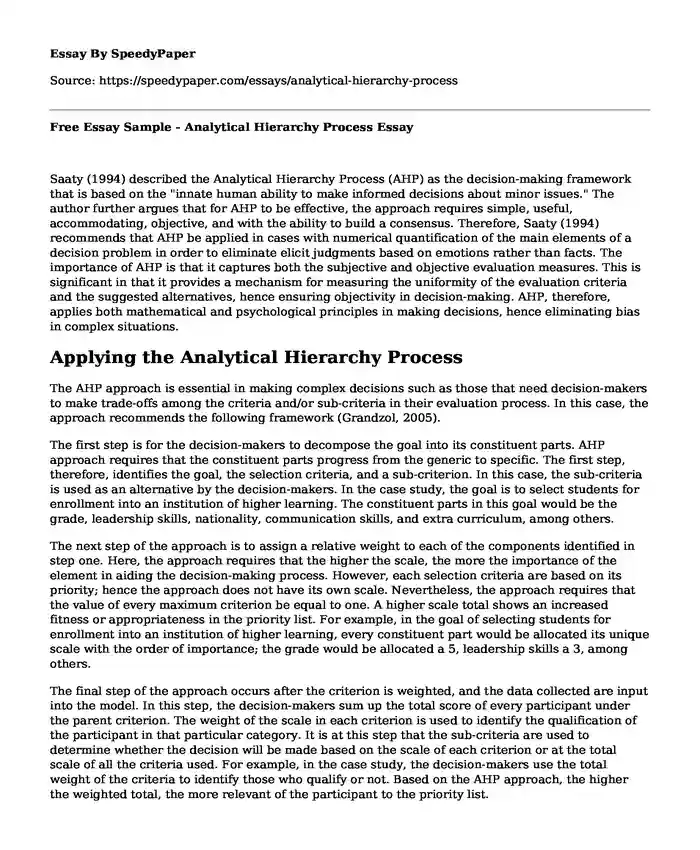
| Type of paper: | Essay |
| Categories: | Psychology Intelligence |
| Pages: | 3 |
| Wordcount: | 575 words |
Saaty (1994) described the Analytical Hierarchy Process (AHP) as the decision-making framework that is based on the "innate human ability to make informed decisions about minor issues." The author further argues that for AHP to be effective, the approach requires simple, useful, accommodating, objective, and with the ability to build a consensus. Therefore, Saaty (1994) recommends that AHP be applied in cases with numerical quantification of the main elements of a decision problem in order to eliminate elicit judgments based on emotions rather than facts. The importance of AHP is that it captures both the subjective and objective evaluation measures. This is significant in that it provides a mechanism for measuring the uniformity of the evaluation criteria and the suggested alternatives, hence ensuring objectivity in decision-making. AHP, therefore, applies both mathematical and psychological principles in making decisions, hence eliminating bias in complex situations.
Applying the Analytical Hierarchy Process
The AHP approach is essential in making complex decisions such as those that need decision-makers to make trade-offs among the criteria and/or sub-criteria in their evaluation process. In this case, the approach recommends the following framework (Grandzol, 2005).
The first step is for the decision-makers to decompose the goal into its constituent parts. AHP approach requires that the constituent parts progress from the generic to specific. The first step, therefore, identifies the goal, the selection criteria, and a sub-criterion. In this case, the sub-criteria is used as an alternative by the decision-makers. In the case study, the goal is to select students for enrollment into an institution of higher learning. The constituent parts in this goal would be the grade, leadership skills, nationality, communication skills, and extra curriculum, among others.
The next step of the approach is to assign a relative weight to each of the components identified in step one. Here, the approach requires that the higher the scale, the more the importance of the element in aiding the decision-making process. However, each selection criteria are based on its priority; hence the approach does not have its own scale. Nevertheless, the approach requires that the value of every maximum criterion be equal to one. A higher scale total shows an increased fitness or appropriateness in the priority list. For example, in the goal of selecting students for enrollment into an institution of higher learning, every constituent part would be allocated its unique scale with the order of importance; the grade would be allocated a 5, leadership skills a 3, among others.
The final step of the approach occurs after the criterion is weighted, and the data collected are input into the model. In this step, the decision-makers sum up the total score of every participant under the parent criterion. The weight of the scale in each criterion is used to identify the qualification of the participant in that particular category. It is at this step that the sub-criteria are used to determine whether the decision will be made based on the scale of each criterion or at the total scale of all the criteria used. For example, in the case study, the decision-makers use the total weight of the criteria to identify those who qualify or not. Based on the AHP approach, the higher the weighted total, the more relevant of the participant to the priority list.
References
Saaty, T. L. (1994). How to make a decision: the analytic hierarchy process. Interfaces, 24(6), 19-43.
Grandzol, J. R. (2005). Improving the faculty selection process in higher education: a case for the analytic hierarchy process. IR applications, 6(24), 1-13.
Cite this page
Free Essay Sample - Analytical Hierarchy Process. (2023, May 07). Retrieved from https://speedypaper.com/essays/analytical-hierarchy-process
Request Removal
If you are the original author of this essay and no longer wish to have it published on the SpeedyPaper website, please click below to request its removal:
- My Severe Academic Anxiety, Essay Sample
- Essay Sample: Women in Politics
- Essay Sample: Higher Education Opportunities and Advancements for Alaska Native Women
- Homer Hickman's Heroic Journey, Conflicts and Obstacles. Paper Example
- Essay Sample on Intelligence Feedback
- Essay on Strategic Healthcare Management: Unlocking Employee Engagement
- Global Patterns: Oppressed Women in Domestic Work and the Sex Trade - Essay Sample
Popular categories




